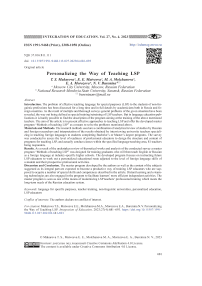Personalizing the way of teaching LSP
Автор: Makarova T.S., Matveeva E.E., Molchanova M.A., Morozova E.A., Burenina N.V.
Журнал: Интеграция образования @edumag-mrsu
Рубрика: Академическая интеграция
Статья в выпуске: 4 (113), 2023 года.
Бесплатный доступ
Introduction. The problem of effective teaching language for special purposes (LSP) to the students of non-lin-guistic professions has been discussed for a long time and in full details by academicians both in Russia and foreign countries. As the result of multiple and thorough surveys general problems of the given situation have been revealed, the way out being defined as special training/retraining of LSP teachers. But in language education publications it is hardly possible to find the description of the program aiming at the training of the above mentioned teachers. The aim of the article is to present effective approaches to teaching LSP and offer the developed master program “Methods of teaching LSP” as a means to solve the problems mentioned above.
Language for specific purposes, teacher training, non-linguistic universities, personalized education, lsp educators
Короткий адрес: https://sciup.org/147242378
IDR: 147242378 | УДК: 37.016:811.111 | DOI: 10.15507/1991-9468.113.027.202304.681-693
Список литературы Personalizing the way of teaching LSP
- Tareva E.G., Tarev B.V. The Assessment of Students' Professional Communicative Competence: New Challenges and Possible Solutions. XLinguae. 2018;11(2):758-767. https://doi.org/10.18355/XL.2018.11.02.59
- Anikina N.V., Ivanova I.A., Gordina S.V. [The Informational Culture of a Personality as an Integral Marker of a Person's Development Level in the System of Continuous Education]. Integration of Education. 2012;(4): 108-113. (In Russ.) Available at: https://edumag.mrsu.ru/content/pdf/12-4.pdf (accessed 20.06.2023).
- Földes Cs., Furmanova V.P. Intercultural Communication in the Professional Training of Master's Students: Concept and Structure of a Joint Educational Project. Integration of Education. 2020;24(4):591-607. (In Russ., abstract in Eng.) https://doi.org/10.15507/1991-9468.101.024.202004.591-607
- Cherkashina E.I. Modern Tendencies in Foreign Language Teachers Training. Tomsk State Pedagogical University Bulletin. 2012;(5):58-64. (In Russ., abstract in Eng.) Available at: https://vestnik.tspu.edu.ru/files/ vestnik/PDF/articles/cherkashina_e._i._58_64_5_120_2012.pdf (accessed 20.06.2023).
- Yazikova N.V [Content and Language Integrated Teaching of Professional Communication on the Basis of a Textbook Professional Communication]. Foreign Languages at School. 2021;(7):55-63. (In Russ.) EDN: MAMTJR
- Grinev-Grinevich S.V., Sorokina E.A. [Studying Scientific Notions Development on the Basis of their Nomination Dynamics]. Cognitive Language Studies. 2023;(1):157-166. (In Russ.) EDN: CSBMHF
- Sorokina E.A. Features of the Russian Professional Language in the Field of Linguistics. Vestnik Severno-go (Arkticheskogo)federal'nogo universiteta. Ser.: Gumanitarnye i sotsail'nye nauki. 2021;(1):82-91. (In Russ., abstract in Eng.) https://doi.org/10.37482/2687-1505-V077
- Kic-Drgas J. Translation in the ESP Teaching. The Journal of Teaching English for Specific and Academic Purposes. 2014;2(2):253-261. Available at: http://espeap.junis.ni.ac.rs/index.php/espeap/article/view/100 (accessed 20.06.2023).
- Tareva E., Kazantseva A., Tarev B. The Impact of Addressee Factor for Scientific Text Writing. In: Anikina Z. (ed.) Integrating Engineering Education and Humanities for Global Intercultural Perspectives. IEEHGIP 2022. Lecture Notes in Networks and Systems. Vol. 131. Cham: Springer; 2020. p. 751-759. https:// doi.org/10.1007/978-3-030-47415-7_80
- Morell T. EMI Teacher Training with a Multimodal and Interactive Approach: A New Horizon for LSP Specialists. Language Value. 2020;12(1):56-87. https://doi.org/10.6035/LanguageV.2020.12.4
- Vikulova L., Khoutyz I., Makarova I., Gerasimova S., Borbotko L. Information Resources for Foreign Language Teachers' Self-Development: Overview. In: Anikina Z. (ed.) Integrating Engineering Education and Humanities for Global Intercultural Perspectives. IEEHGIP 2022. Lecture Notes in Networks and Systems. Vol. 131. Cham: Springer; 2020. p. 119-127. https://doi.org/10.1007/978-3-030-47415-7_13
- Goryunova E.S., Frantsuzskaya E.O., Kulakovskaya K.V., Andreeva T.L., Sidorova T.B. Experience of "Theory and Practice in Foreign Languages Teaching (English, French, Chinese, Japanese, Korean)" Training Provision in Tomsk State University. Bulletin of Kemerovo State University of Culture and Arts. 2018;(45/1):127-135. (In Russ., abstract in Eng.) Available at: https://vestnik.kemgik.ru/upload/iblock/0bc/0bcd7faab6495ec9f41c3d4 df67bd0ff.pdf (accessed 20.06.2023).
- Basturkmen H. LSP Teacher Education: Review of Literature and Suggestions for the Research Agenda. Ibérica. 2014;(28):17-34. Available at: http://www.revistaiberica.org/index.php/iberica/article/view/237 (accessed 18.01.2023).
- Hall D.R. Teacher Education for Language for Specific Purposes. In: Encyclopedia of Applied Linguistics. Oxford: Blackwell Publishing; 2013. p. 5537-5542. https://doi.org/10.1002/9781405198431.wbeal1144
- Gu H., Bo H., Ren L. Developing ESP Teaching Materials Based on the Analysis of Information Engineering Majors' Needs. Open Journal of Social Sciences. 2019;7(10):121-131. https://doi.org/10.4236/ jss.2019.710011
- Taillefer G. CLIL in Higher Education: the (Perfect?) Crossroads of ESP and Didactic Reflection. ASp. 2013;63:31-53. https://doi.org/10.4000/asp.3290
- Corino E., Onesti C. Data-Driven Learning: A Scaffolding Methodology for CLIL and LSP Teaching and Learning. Frontiers in Education. 2019;4. https://doi.org/10.3389/feduc.2019.00007
- Kic-Drgas J. Development of Soft Skills as a Part of an LSP Course. E-mentor. 2018;(2):27-36. http:// dx.doi.org/10.15219/em74.1349
- Tenieshvili A. Towards Various Aspects of Teaching Language for Specific Purposes (LSP) at Higher Education Institutions. Journal of Foreign Language Education and Technology. 2019;4(1):111-126. Available at: https://www.jflet.com/articles/towards-various-aspects-of-teaching-language-for-specific-purposes-lsp-athigher-education-institutions.pdf (accessed 18.01.2023).
- Bovtenko M., Kuchina S., Panova E., Shifman D., Barancheeva E. Digital Multimodal Projects in LSP and CLIL Courses. In: Anikina Z. (ed.) Integration of Engineering Education and the Humanities: Global Intercultural Perspectives. IEEHGIP 2022. Lecture Notes in Networks and Systems. Vol. 499. Cham: Springer; 2022. p. 243-252. https://doi.org/10.1007/978-3-031-11435-9_26
- Voynatovskaya S.K., Antonova S.V., Sevinf S. Innovative Learning Platforms in LSP Teaching at the University Level. Herald of Chelyabinsk State Pedagogical University. 2018;(6):68-77. https://doi.org/10.25588/ CSPU.2018.88..6..005
- Silva E.M., Chumbo I., Gonfalves V., Martins C., Dotras Bravo A., Alves A.M. The QuILL Project: Embracing Digital Technology in LSP Teaching in Higher Education. In: Proceedings of XVII CercleS International Conference 2022. Porto; 2022. Available at: https://bibliotecadigital.ipb.pt/handle/10198/25893 (accessed 18.01.2023).
- Yazykova N.V. [A Contemporary's View on the Evolution of Paradigms in TFL Methodology]. Foreign Languages at School. 2019;(5):12-17. (In Russ.) EDN: CCRYBX
- Tareva E.G. [Approaching Foreign Language Teacher Mindset]. Foreign Languages at School. 2022;(5):5-13. (In Russ.) EDN: RZZXUD
- Ambarova P.A., Zborovsky G.E. Professional Adaptation of University Students in the Changing World of Professions. The Education and Science Journal. 2023;25(2):191-223. https://doi.org/10.17853/1994-5639-2023-2-191-223


